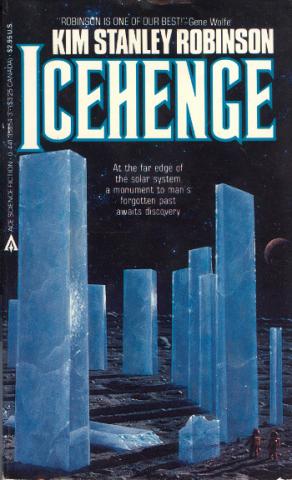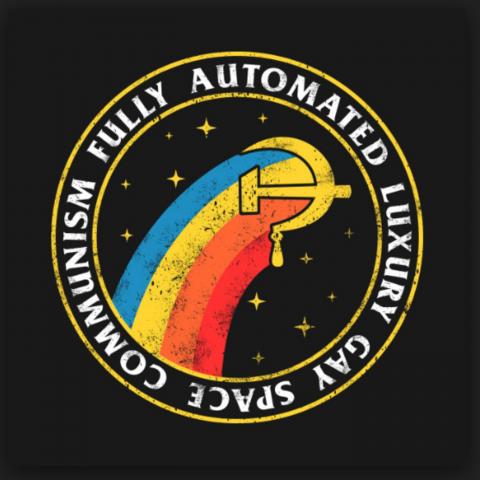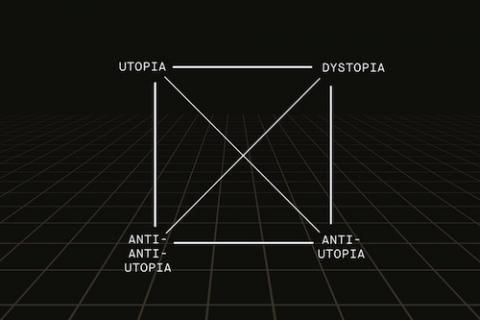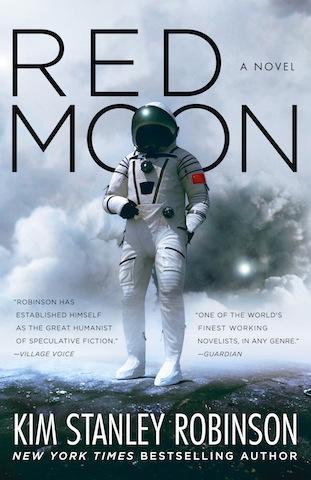Gene Wolfe and Earth Day
Submitted by Kimon
First, a sad news. About a year after UKL, SF/literature Grand Master Gene Wolfe passed away in April. Wolfe has been there since the beginning of Stan Robinson's career in the 1975 Clarion writers' workshop; he influenced him from the very beginning, and they have been long-time friends.
Indeed, the above illustration is a cover for Icehenge, with a recommendation from Wolfe. KSR's Icehenge shares with Wolfe's The Fifth Head of Cerberus a three-part structure and themes of ambiguity of reality and historical fact!
Here is what KSR has said about Wolfe in some interviews (Lightspeed, Infinityplus):
[Gene Wolfe and Samuel R. Delany] are two of my favorite writers, and two of my teachers when I was at Clarion in 1975, and two of the people I’ve read all through their whole careers, and two human beings I revere and feel are exemplary figures.
[Gene Wolfe] has contributed so much. In short, greatness. He is similar to the great modernist masters of the first half of the century, people like Stevens or Proust or Woolf, in that he has a very powerful personal vision, and great moral complexity and intensity, expressed in beautiful prose and surreal imagery, in many superb stories and novels. We in the sf community can point to his work as evidence that science fiction is capable of achieving all that modernism ever hoped for literature, and then some, in that he plots better than most of the modernists.
And of course KSR wrote the introduction to the 2011 short story collection "The Very Best of Gene Wolfe", available at NYRSF:
I am proud to know him even a little, and speaking with full confidence for the science fiction community, which is like a small town scattered over the face of the earth and across time too, I’ll say: we are proud of Gene Wolfe. We have published him, we read him with joy, we celebrate him; we will always have reason to be proud of that. Gene shows that literature can be everything, a game, a mystery, a religion, a dive into the deepest depths.
RIP, Master Wolfe.
Since its release last October, KSR's latest novel Red Moon has been in the bestsellers list for hardbacks! As compiled by Locus from many sources (October, November, December - data comes in with a few months' delay). Also, Red Moon has been nominated for a Locus Award!
KSR was a keynote speaker at the Nelson Institute for Environmental Studies of University of Wisconsin-Madison for Earth Day on April 22 (named after the Wisconsian Gaylord Nelson, who founded Earth Day in 1970!). His talk was titled "Imagining the Possibilities: Climate, Technology, and Society". Some reporting from the talk in this article -- "Although the human population is never really the main point of our environmental problem because different humans use different amounts of energy and carbon. The fewer people there are, the less pressure on the planet, but it also depends how those people live. If you live cleanly, the numbers aren’t the problem." -- and I'm sure a video of this will surface soon.
While there, KSR was interviewed by a Madison radio show: KSR on Public Affair, on his career writing SF, Green New Deal, carbon tax, the Extinction Rebellion and Wisconsian Aldo Leopold.
He was also intervewed by the always-reliable Gerry Canavan, for Edge Effects. The fascinating discussion ranged from geoengineering, ecological consciousness in an age of rising right-wing politics and the place of SF today. The entire conversation is available here. A highlight:
The thing that I gives me hope is the Paris Accords. When we first began this discussion maybe fifteen years ago, that would have been a completely utopian prospect. If I’d said, well, what we need is an international organization that’s under the U.N. auspices, where all the nations come to agree to their own carbon burn reduction and that would be a framework going forward—if I’d proposed that—it would have been a Robinsonian utopian science fiction idea. And yet it happened in the real world. Of course, it’s not enough. It’s endangered. It’s just a set of promises, and there is no sheriff. There’s no sheriff on this planet to make us do the right thing.
A second interview I wanted to highlight is a particularly lively and enjoyable discussion with the Antifada podcast: "Fully Automated Luxury Gay Space Communism w/ Kim Stanley Robinson" (the logo of which is too cool not to include here, at the bottom!). Topics discussed: Ursula K Le Guin, bird counting, being taught by Jameson about Philip K Dick, thinking about violent vs "smart" revolution, on the "too easy" quality of writing dystopias, the discussion around the Green New Deal and what is considered acceptable in the mainstream, billionnaires and innovation and taxation, the Democratic Socialists of America, computing power and the planned economy, blockchain, carbon quantitative easing, writing about drugs and sex, the omnipresence of screens and video games, gender fluidity and family and sociobiology, psychedelics. spirituality!... This was reposted by the Chapo Trap House podcast, too.
Another highlight is this older (November 2018) interview I did not link to earlier, an extensive exchange for the open-access online journal NatureCulture, "Writing Science Fiction Out of Experience: SF, Social Science and Planetary Transformations". Plenty of things to highlight here: several of KSR's influences and readings -- Marcel Mauss, Lewis Hyde, Michael Taussig, Donald Mackenzie, Bruno Latour, Frederic Jameson, Mario Biagioli, Gary Snyder, Ram Dass, Wai-lim Yip, Wang Hui -- his reading of Configurations (transdisciplinary journal about the interplay between science, technology, and the arts), the valorization and critique of science and technology studies, science vs capitalism, and detailed discussion of his works and themes.
On a particular though line in his novels:
from the Mars novels: "both science fiction and metaphor or allegory, or a kind of modeling by miniaturization or what Jameson called ‘world reduction’—Martian society would be smaller and thus simpler, and it would be very obviously revealed to be necessarily also a place where people were actively engaged in making the biophysical substrate that we need to live."
...to Aurora: "an attempt to explain why that same process of terraformation and human inhabitation that might work on Mars would not work outside this solar system [...] it does shine light from a different angle on the difficulties of terraforming even Mars, where now we are not sure if it is alive or dead"
...to Red Moon: "the moon is different again—too small and volatile-free to be terraformed, and thus just a rock in space, a place for moon bases perhaps, but not for habitation as we usually think of it."
...and what he takes out of it all: "these stories have together convinced me that we co-evolved with Earth and are a planetary expression that needs to fit in with the rest of the biosphere here, that we have no other choice about that—and this is an important story for science fiction to tell, given there are so many other kinds of science fiction stories saying otherwise."
On his approach to pragmatism and ideology:
I am definitely in favor of pragmatic, impure forms of experimentation when it comes to survival by way of getting ourselves into a sustainable balance with our planet. And yes, I don’t like people proclaiming too vigorously their purity. That plays into a model of pure/impure that leads to sacred/profane, or simply good/bad, that I don’t think matches the biophysical realities of our position as living creatures on a planet, as a species trying to get along with other species. Most of the various “pure” positions are too self-righteous for me, too non-scientific. [...] Market fundamentalism is a pure idea that has failed badly but still controls far too much of our work and thinking, for instance. So I often find myself telling stories about this kind of conflict between pure and pragmatic, and about the need for open-minded approaches to our problems.
On science and regulating its development:
There’s an implied goal in science, to add to human power and to decrease human suffering; these are either derivative effects or preliminary axioms, but in any case they are philosophical or ethical matters that lie outside the scientific method itself, they are the why driving the how.
[...] As part of all that, the more we know, the more we may be able to act on behalf of humanity and the biosphere of Earth. So in fact “science” should always be trying to “speed up,” at least in its understanding. Maybe in applications that one finds in engineering etc., there should be some slowing down, yes. But here we’re slipping around between science as science and science as a word for STEM.
After we learn new things, what should we do with what we know and what we’re learning? That’s what your question is referring to, I’m sure. There we are talking about law, and about the nexus of politics and economics that results in a power dynamic of some humans over other humans and over the biosphere. Powerful people trying to use scientific results to maximize profits no matter the costs to people and biosphere—they definitely need to be “slowed down.” As in disempowered and in some cases jailed. The economist John Maynard Keynes called this “the euthanasia of the rentier class,” an ominous-sounding phrase for someone as moderate at Keynes, but he definitely said something like this. In any case, the problem of what to do with our science is not a question internal to science or even to STEM practitioners. It’s a political question or a philosophical question, with answers that begin in philosophy and quickly turn into political economy.
On writing Red Moon and China:
when I wrote my alternative history, I took in so much Chinese history that I felt I knew the place. So, after all that, I thought I would try writing about China in the near future. [...] Ultimately when it came to the question of me writing a novel, I found that China was too big while the moon was too small. Some good choices concerning point of view and other formal aspects of the novel allowed me to find my way to a story I like, despite these problems. In the end the characters made it for me.
On the citizen revolutions in New York 2140 and Red Moon:
There are all kinds of inputs to this project, but an important one is a group of radical economists I ran into about ten years ago; these people been helping me think the particulars of how a “householders’ union” could seize power from finance and shift it back to people.
On artificial intelligence in Aurora and Red Moon:
I used to be an AI skeptic, but then I thought, what do I really know about this? Nothing; I’m basically just judging sentences uttered by other people for their plausibility as science fiction stories. So I’ve tried, since having that thought, to listen to some of the people on the cutting edge of research and experimentation in this regard. Some of them doubt we can even get self-driving cars, and fear another “AI funding crash” following over-hype, as in the early 1970s. But even these skeptics are doing the work, so I think it behooves a science fiction writer to pay attention and at least consider some ramifications, without falling into old cliches.
And two interesting bits that are unique insights about the relations between writer and reader:
I wonder, if it had occurred to me while writing, if I would have chosen it. But it never did occur to me. And truthfully, it feels odd to speak about choosing the incidents in my plots. I know it must be true that that happens, but it feels more like these stories just happen to me, like dreams do. I’m not a lucid dreamer; my dreams seize me. And my novels too.
A novel is a shared project between writer and reader, very strange when you think of it, and very satisfying to feel when on either side of the action. Because the novel is a heteroglossia, a polyvocal exercise in which the novelist choreographs things that everyone is already feeling, the power of any novel is limited—it has to fit the zeitgeist somehow to be read at all, and then it exists as part of a complex feedback loop, and may not so much make change as express it.
Meanwhile, Earth Day in UC Berkeley was celebrated with the exhibit "Earth Day 3019: Mapping Climate Fiction", which paired cli-fi novels with maps and graphs related to the books’ locations, and KSR's New York 2140 was included!
NY2140 has been included in many articles of late discussing climate change and life in cities, for instance this Guardian article on books about building cities, or this Vice News little interview with KSR for HBO on his future New York City after sea level rise, or this Conversation article discussing the impact of SF in public discourse.
As for more proof that climate change is on everybody's mind, here is a bit of trivia: KSR's NY2140 was mentioned in Jeopardy, and the man who it seems coined the term "cli-fi", Dan Bloom, wrote about it!
We have reported about KSR being the judge for the short fiction contest by Arizona State University's Imagination and Climate Futures Initiative. "Everything Change: An Anthology of Climate Fiction, Volume II" has now been published (online, creative commons), featuring a foreword by KSR! More about the winner author and the collection here.
Speaking of forewords, KSR wrote the introduction to a new beautiful edition of Philip K. Dick's UBIK.
Finally, lest you forget, Matt and Hilary are fast ploughing through the Mars trilogy in their Marooned! on Mars podcast -- quick, catch up on this landmark KSR-inspired work!





